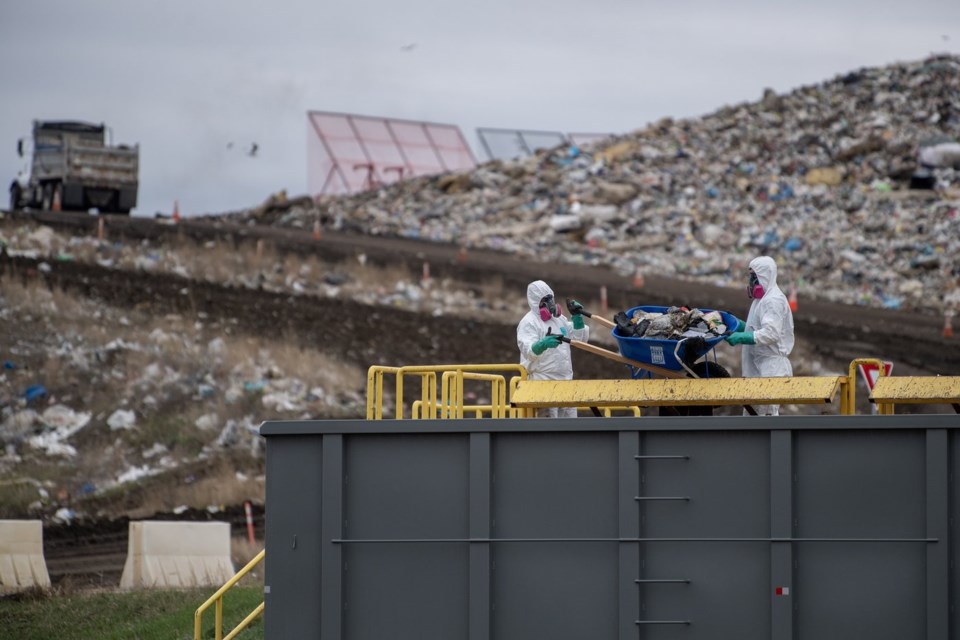SASKATOON, Sask. — Saskatoon police announced Tuesday they had found the remains of a missing woman in a city landfill three months after their search began.
Police, dozens of searchers and a forensic anthropologist began combing through trash at the site in May in an attempt to find Mackenzie Lee Trottier.
The 22-year-old Métis woman was last seen in December 2020.
Paul Trottier told a news conference it had been a long and difficult time trying to find out what happened to his daughter. The 93 days police spent searching the landfill were particularly tough, he said.
"Today, we have our answers. Mackenzie is home," he said.
Trottier thanked police and Métis and Indigenous groups for their support. "Our (Missing and Murdered Indigenous Women) family, victim services ... and our friends and family — you have been the fabric that have held us together," he said.
Police Chief Cameron McBride said an autopsy could not determine the cause of Trottier's death and the case has been turned over to the Saskatchewan Coroners Service.
Staff Sgt. Corey Lenius said a suspect in Trottier's disappearance died of a drug overdose in December 2023. Because police can't lay charges against him, Lenius said, the man's identity won't be released.
He did not say if the death is considered a homicide.
Lenius added that Trottier and the suspect knew each other, and Trottier stayed at the man's home "quite often."
It was data from the man's cellphone that pointed investigators to the landfill, the officer said.
"We were able to observe his search engine, so some of his common searches around that time when Mackenzie went missing was, 'When's the next garbage pickup?'" Lenius said.
"We were also able to be 100 per cent sure that he didn't leave his residence at all during that crucial time that she went missing."
Ernie Walker, a forensic anthropologist who oversaw the landfill search, said finding Trottier's remains was "a fluke."
"These kinds of big searches of landfills are not commonly successful," said Walker, adding that he was previously involved with two other searches at the Saskatoon site.
Walker said the city's ability to track waste from pickup spots to the landfill was what allowed this search to succeed, because it provided a rough estimate of the area to go through.
"Your search is only as good as the investigative data that you have to start with," he said. "It's not a free-for-all."
Police estimate about 5,000 tonnes of waste was sorted through in the search for Trottier. Some of her remains were found July 30, and the rest of her remains were discovered Thursday.
McBride said an estimated $1.5 million was spent on the landfill search. Police have asked for funding support from the federal and provincial governments, he added.
"At every step of the way, we came to the conclusion that it was the right thing to do," he said.
A search for the remains of two slain First Nations women is set to get underway later this year at a landfill just north of Winnipeg.
Manitoba Premier Wab Kinew announced earlier this year there is a multi-stage plan to search the Prairie Green landfill for the remains of Marcedes Myran and Morgan Harris.
Jeremy Skibicki was convicted last month of first-degree murder in the deaths of Myran, Harris and two other Indigenous women. Court heard he killed the women and disposed of their bodies in garbage bins.
Winnipeg police and the former Progressive Conservative government refused to search the landfill, saying it would be too complex and dangerous.
The NDP government, elected last year, promised there would be a search. A provincial spokesperson said Tuesday the forensic anthropologist for the search has been following the Saskatoon case closely.
"Manitoba's team looks forward to meeting with the Saskatoon team to learn from their success," the spokesperson said in an email.
This report by The Canadian Press was first published Aug. 6, 2024.
— By Jack Farrell in Edmonton
The Canadian Press



